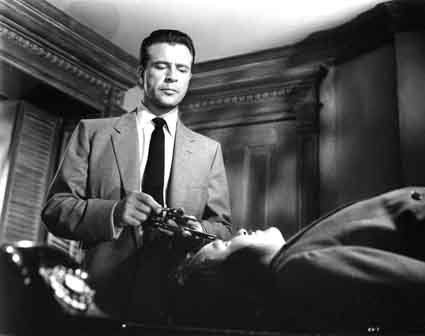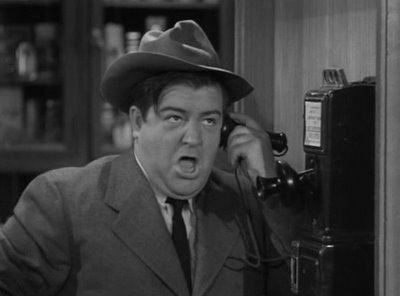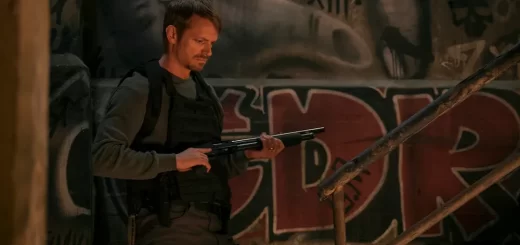TCM Fest part 5- Obviously Crime Pays, by Scott Nye
“Obviously crime pays, or there’d be no crime.” – G. Gordon Liddy
Is there any genre more directly tied with classic film than the crime flick? The snappy dialogue, the bitter men, the beautiful (but dangerous!) women, and the guns make for a wonderful collection of tropes that Hollywood continues to recycle to this day (see: the upcoming Gangster Squad). So it may come as some surprise that of the fourteen films I saw at TCM Fest, only one was a real, honest film noir. This was partially for purposes of self-preservation and a desire for variety. One week after TCM Fest ended, the wonderful Noir City began, and in just a few short days, LACMA is embarking on a great series concentrating on Los Angeles noir. Nevertheless, criminal enterprises were not entirely absent from my slate.
The regular, old-fashioned crime film was a little diddy called Cry Danger, which has one hell of a set-up – Rocky Mulloy (I love movies so much), sentenced to life in prison for a crime he didn’t commit, is sprung five years later when a witness, Delong, suddenly appears to corroborate his alibi. But Rocky’s never met Delong before, which is okay by the latter, who only stepped up in hopes of getting Rocky to lead him to the undiscovered stash, but becomes a lot less okay when he finds out Rocky really is innocent. The rest of the film goes about finding who isn’t, and making them pay.
Cry Danger is the kind of low-budget LA-set noir that were churned out constantly by independent investors. Dick Powell, who plays Rocky, made his bones a-singin’ and a-dancin’ through the Depression with Busby Berkeley, but by 1951 had successfully redefined himself as a no-nonsense tough guy. To compare the Powell of Cry Danger with the piano-playing lovebird in Gold Diggers of 1933 is like looking at two completely different people, and the former is his baby from top to bottom. In his introduction for the film, noir expert Eddie Muller and star Rhonda Fleming (who plays Rocky’s lover-turned-best-friend’s-wife-turned-lover-again) talked about how Powell put together the screenplay, the financing, and gave director Robert Parrish his first directing job. Parrish was editor before he helmed Cry Danger, and even won an Oscar for editing Body and Soul, and he brings almost a natural understanding to his role here.
But the real highlight is Richard Erdman as Delong. Now admittedly, Erdman has the best role as the boozy accomplice, with lines like “Listen, doll girl, when you drink as much as I do, you have to start early.” But he also has a great, lived-in drawl that really makes you believe this guy spends most of his time in bars, constantly searching for a good time. He provides a perfect counterpoint to Powell’s assertive badass, and although there isn’t a real, clear motivation for why Rocky keeps him around (I’m not sure many friendships are built on trying to fleece people, but then I don’t get out as much as I’d like), he does make for great company. Also, there’s an interesting sidebar to Erdman – his film career petered out soon after Cry Danger, but he continued to work on television in varying capacity for the decades to follow, and can now be seen regularly on Community as Leonard. So there’s that.
As fun as a good performance can be in a crime flick, they really make or break comedy, and let’s just say there’s a reason that Bud Abbott and Lou Costello were as successful as they were. While I at first wasn’t sure about the benefit of slogging to a 9am screening of one of their films, it didn’t take long for Who Done It? to win me over. For starters, whoever it was that figured out that comedies work best with an audience…I tell ya, they were onto something. But Who Done It? is just a spectacular film in any context. In it, the duo play soda jerks who long to be writers for their favorite mystery show (this is back in the days when a “show” was on the radio, mind). When given the opportunity to watch a broadcast, they leap at it, but on that very night, the producer is murdered! So they take their passion for mystery-writing and pose as detectives to solve the case! Which, naturally, arouses the suspicion of the real detectives who come in not long after them.
Abbott and Costello’s comedy, like many others at the time, was intensely one-liner joke-based, rather than the kind of witty rapport one might get in a Howard Hawks film or the gag-based humor of modern comedies. But it still plays very, very well, leaving our audience in stitches for extended periods. And the film played pretty well on the big screen. It was directed by Erle C. Kenton, who is most famous these days as the man behind 1933’s The Island of Lost Souls, and he lent it a tremendous, almost noir-esque atmosphere. As archivist Michael Schlesinger (whose boundless energy provided a needed wake-up call!) exclaimed in his introduction, a great deal of the film’s energy comes because it’s genuinely tense – “somebody actually dies! The boys are in real danger!” It may be played for laughs, but the stakes aren’t kidding around.
It really was, pound-for-pound, the most fun I had at the festival, and I highly recommend you indulge in same. It’s the kind of thing that makes you remember why you love movies, not just for a certain director’s style or someone’s star power or the gritty pleasure of a solidly-wrought screenplay, but because it’s two very talented guys putting on a show for you. The vaudeville tradition that was carried over to cinema is almost entirely stamped out, but man, when it was on, it was on.
Another entry in the “unexpected thrills” department was made with John Frankenheimer’s 1977 film Black Sunday, which tells the (fictional) tale of the terrorist group Black September’s attempt to kill everyone attending the 1976 Super Bowl, including the President of the United States. Oh yeah. It’s on. What really makes this movie, however, beyond even Frankenheimer’s ever-tightening, pitch-perfect direction is getting to see Bruce Dern at his Bruce Derniest. Dern was one of those guys who could have only sprang from the ‘70s; he’s a weird-looking character actor who specializes in playing unstable coiled springs waiting to explode. Even when he’s representing corruption-free law and order as The Detective in The Driver, he looks like the kind of guy that would take your face off if you said something that rubbed him the wrong way. He’s the rare actor who could create cinema just by appearing on camera.
And given the role of a Vietnam vet, driven mad by years of torture and turned to collaborating with Black September on their planned attack, Dern is absolutely on fire. He’s a freelance pilot for Goodyear’s blimp, and has the perfect delivery method for their planned attack. He can play the crazy in his sleep, but it’s the unbelievable depression that really stands out, especially when he’s confronted with his rather shallow reasons for taking part in the plan. He crafts one of those definitive ‘70s characters, a guy who’s definitely rotten, but more than anything is just kind of pathetic and lonely.
Don’t think this is all ‘70s introspection and grim morose. I haven’t seen a thriller this, well, thrilling in years. What it does do that filmmkakers in the ‘70s had down pat is show process in a compelling manner. On one side, you’re following Black September and the steps it takes to really pull off such a massive operation. On the other, you’re following American and Israeli intelligence, led by ROBERT FREAKING SHAW as a Mossad agent, trying to track them down and stop it. Shaw is lightyears from Quint, totally calm and in control of every situation, providing the perfect counterbalance to Dern even though they share very little, if any, screentime.
But Frankenheimer keeps this baby moving fast, and even at 143 minutes, never letting up. Things really heat up when they get to the Super Bowl, naturally, with extra tension coming from the production – they filmed live at the 1976 Super Bowl with real Goodyear blimps. While it’s easy to see how most of this section would be fairly unobtrusive (a lot of Robert Shaw standing on the sidelines, speaking into a radio), this is in many ways big-budget cinema verité. For cinephiles, this adds a whole other layer to the proceedings. I know there are some who dismiss production concerns from film appreciation, but I don’t see why the two are so separate. As Truffaut said, “I demand that a film express either the joy of making cinema or the agony of making cinema.” I don’t know that I would go so far, but I do feel that the making of art and the result of that process are intertwined and one should not be dismissed from the other.
Before the film, the man himself, Robert Evans, came out to say a few words. Black Sunday was not a happy memory for him, as he developed the hell out of it and it was widely predicted to be the next Jaws, until its release date got pushed back by Dino De Laurentis’ King Kong. Remember, this is back before the multiplex – you really only could have one major movie opening at a time. This not only lost them some momentum, but forced them to open after the 1977 Super Bowl, and thus the entire football season. Evans reminded us that the NFL wasn’t quite the all-consuming force it would eventually become, so once the season was over, football was pretty much out of the nation’s mind, making Black Sunday seem a little out of step with culture. Leonard Maltin, who was moderating the talk, tried to console Evans by saying “well, you got the TCM Fest, and not [Laurentis],” to which Evans replied, “yeah, I’m here and he’s not!” And while I don’t know that Evans remembered that Laurentis had died fairly recently, or would even be alluding to that, I like to think that, bastard that he is, he said it for precisely that reason.
I don’t mean to denigrate Evans. He’s earned a certain reputation of…let’s say thinking very highly of himself, but it’s not like he hasn’t genuinely earned it. This is the man who not only saved Paramount Pictures, but developed or produced some of the greatest films ever made. He had a vision that was at once intensely his own and remarkably open, and even if he was wrong as often as he was right (when you hear all those stories about Francis Ford Coppola battling Paramount on The Godfather, remember, Evans was Paramount; then again, it was on Evans’ insistence that Coppola was hired in the first place), the buck still stopped with him. His contribution to Paramount’s survival and legacy has hardly been forgotten. An entire block of programming at TCM Fest was accorded to him, and one need only visit the Paramount lot to see their appreciation – an ornate office with his name emblazoned next to the door (which, itself, has two lions on either side) is still reserved for the rare occasion he chooses to visit.
Crime may not always pay for movie criminals – in fact, the Production Code demanded it didn’t, once upon a time – but it continues to be one of the most rewarding genres for audiences, in any form it may take. To twist that Liddy quote above, obviously crime movies pay, or there’d be no crime movies.
































